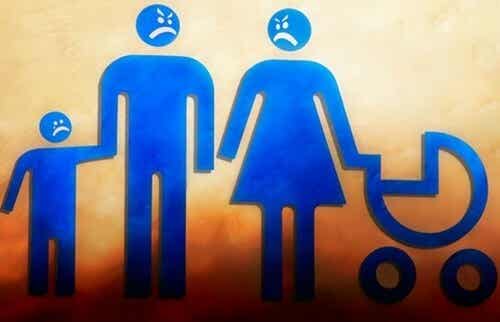In every couple there are relationships of power. When decisions have to be made, desires and needs don't always coincide. It is in these cases that the role of a partner within the relationship manifests itself.

Last update: 30 November 2022
Power relationships within the couple provoke a lot of arguments. Both partners want to have a dominant position, on one or more topics. Many times, the desire to excel is not conscious and the dispute that is created is an end in itself. Power relationships can involve many aspects of a couple's life: the distribution of responsibilities, intimacy or the sexual sphere.
However, the tensions that can arise are not necessarily negative. The problem arises when improper strategies are adopted to obtain this power or when those who have obtained the power do not use it for the good of the partner or the relationship.
It may seem unethical from our modern perspective, but we are not the only ones. All members of the animal kingdom relate to each other through power dynamics.
The power dispute within the couple
Couples are dynamic entities in which a constant reciprocal exchange takes place. In any love relationship (in particular) or social (in general) you can find elements such as persuasion or dominance. These can be indicators of the struggle for power.
The distribution of power within the couple can be complex. It is sensitive to the changes, expectations, wants and needs of individuals. It is also true that, after some time, a stability is achieved that gives partners a role in which they feel comfortable. One will have a say in some moments and the other on other occasions.
Within a couple, for example, the man will be able to decide where to go on vacation while the woman will choose the type of accommodation and the visits to be made. In more established couples this exchange of powers is very frequent. In it preferences are made explicit, but also the awareness of knowing the other. For example, the woman may have friends who have already visited the country of her partner's choice and have information on interesting places to visit.
All of this makes it difficult to distinguish who has dominance within the couple's power relationships. It is important to underline that the predominance of one partner over the other is not always a negative aspect. The problem arises when the dynamics of power relations become dysfunctional or when, to obtain and maintain this power, the partner is harmed.
Problems related to power relations within the couple
In general, the power relationship within the couple, while changing, tends to present a certain balance. The two partners therefore tend to spontaneously find a certain stability. Those who feel more comfortable in a certain role will assume that position naturally. Conflict arises only when the assumption of that particular role does not coincide. In some cases, however, this balance is not achieved spontaneously. Let's find out when power relationships within the couple can be at the center of a conflict.
"To love means to place ours in the happiness of others."
-Gottfried Leibniz-
Case 1. Couple formed by two dominant people
Sometimes it can happen that both members of a couple take on the role of leader (leadership role). When this happens, the most obvious consequence is that a lot of arguments arise. Both partners want to be right and the other is willing to listen. In these cases it is difficult to give up part of one's power.
If you think you are experiencing dynamics similar to this one, one way to deal with the situation is to actively engage in trying to understand your partner. To do this, developing skills such as empathy can be very helpful.
Case 2. Couple formed by two people who tend to follow orders
When none of the members of the couple want to have a dominant role in the relationship, discomfort and inadequacy can be felt. This is because neither is able to take the initiative. In this way, situations will arise in which insecurity reigns. If this trend remains constant over time, it can wear down the relationship.
In many cases a compromise is reached when both members of the couple share their opinions and try to find an agreement. For example, they may decide to take the initiative once by one.
“Never above you, never below you; always next to you. "
-Walter Winchell-
A reflection on the relationships of power within the couple
The power relations within a couple are configured in an unconscious and natural way. Everyone gains more weight in decisions where he has more interest and knowledge.
The tensions that arise are greater in the post-infatuation period. In this phase we begin to take stock of the couple's life by yielding less and showing a greater interest in affirming one's preferences than what was done before.
In the event that the positions taken are the source of inexhaustible disputes, it will be necessary for the couple to reflect on the weight of each member in certain decisions. It is also necessary to understand which strategies are valid and which are not to achieve a goal. For example, it may be decided that emotional blackmail is not the right strategy to convince the other to clean the house or to have sex.


























